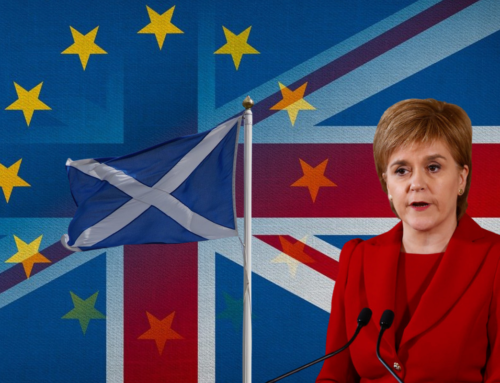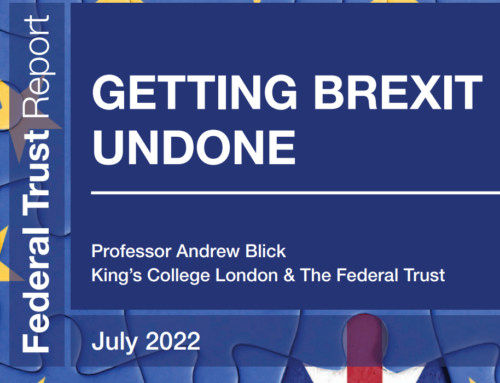
by Brendan Donnelly, Director, The Federal Trust
22nd May 2018
The Irish strand of the current negotiations between the UK and the EU presents a rich case study in the delusions and dilemmas of Brexit. It is difficult to think of any other area of the negotiations which more neatly encapsulates the failure of the Brexit reality to correspond with the predictions and assumptions of the “leave” camp in 2016.
Although Ireland was not a major issue during the 2016 referendum, it was regularly discussed during the campaign, with those on the “Remain” side arguing that the disruption likely to be caused on the island of Ireland by Brexit was a powerful reason for the UK to remain in the European Union. This argument was either ignored, or met with the specious attempted rebuttal that goods, services and people had moved freely within the island of Ireland before the UK joined the European Union. Why should this position not be reinstated after Brexit? The supposed problems of Brexit for Ireland were, said those in favour of Brexit, being deliberately overstated by the “Remain” camp for campaigning reasons.
It has become obvious since the referendum that even if there was some overstatement during the campaign from the “remain” side, then the “leave” side were guilty of a much more damaging understatement of the difficulties that would arise from the UK and the Republic of Ireland’s becoming neighbours that belonged to different economic and trading blocks. If Brexit occurs, Ireland will become an important land border of the EU with a major country that has decided to leave the Union. None of this is remotely parallel to the situation which obtained before 1973, when neither the UK nor Ireland were members of the Union. It was and is intellectual negligence of a high order not to understand that this new asymmetry between the Republic of Ireland and Northern Ireland creates challenges and dilemmas for the United Kingdom, for Ireland and for the EU as a whole.
The Irish government well knows that the free social and economic intercourse within the island of Ireland encouraged by the Republic’s and the UK’s common membership of the EU has been a lynch-pin of the Irish peace process since the Good Friday agreement. They rightly fear that Brexit will put this free interchange within the island of Ireland at risk. They are wholly unimpressed by the British Prime Minister’s assurances that she will be negotiating a “bespoke” deal between the UK and the EU which will preserve all the benefits of British membership of the EU not merely for Northern Ireland but also for the United Kingdom as a whole. “Having our cake and eating it” is no longer officially British government policy in the Brexit negotiations, but Irish officials fear that it is a concept that lives on in the reassurances of the British side that the achievements of the Good Friday agreement can be perpetuated within the overall framework of the UK’s future relationship with the EU. That is why they are insisting on a “backstop,” an irreducible minimum of protection for ease of social and economic exchanges within the island of Ireland, a minimum beneath which the British government will never be allowed to fall.
Much to the surprise of many British politicians and commentators advocating Brexit, the Irish government has been notably successful in integrating its specific concerns about security and the future of the Good Friday Agreement into the general approach of the European Union to the Brexit negotiations. It had often been assumed in British Eurosceptic circles that because of its economic vulnerability to the consequences of a particularly disruptive Brexit, the Irish government would be a voice urging the most accommodating stance possible towards the UK as it left the Union. There was even wild talk of Ireland’s wishing to follow the British example in leaving the EU. The recent opinion poll finding that support for Irish membership of the EU is now at record levels shows precisely how fantastical such expectations were. Ireland has on the contrary understood that its best chance of defending and advancing its interests, if necessary against its powerful British neighbour, is as a small but influential member of the large community which is the European Union.
This Irish option has until now been demonstrably successful. The British government knows that the whole future of the Brexit negotiations depends upon its ability to meet the concerns of the Irish government. The recent flurry of well-publicised controversy within the British government has been an implicit recognition of this reality. Mrs. May’s reported unreflective remark last December to Michel Barnier about the relative importance of the UK and Ireland for the future of Europe apparently met with the withering retort that in the Brexit negotiations the UK was not just dealing with Ireland but with the EU as a whole. Expectations that the unity of the European Union in its support for Ireland would fracture have turned out to be wholly misplaced. The Commission has more than competently fulfilled its traditional role as protector of the small member states. The hope that Mrs. May would have a quiet word with Mrs. Merkel and the latter would then rein in the Irish government has been shown to be the purest fantasy. In the whole of the Brexit negotiations, the British hope that Germany would act as its favoured partner for these negotiations has been confounded on occasion after occasion. The Irish case is a particularly striking aspect of this phenomenon.
It must be more than doubtful whether the most recent suggestions of Mrs. May for the resolution of the Irish impasse will be sufficient. If the proposal for extended membership of the Customs Union is time-limited it will contradict the whole rationale of the desired Irish backstop. If the British suggestions are confined to the Customs Union they will meet only some of the difficulties with which the Irish government is confronted. Nor will the European Union be willing to extend to the rest of the UK proposals specific to Northern Ireland, as Mrs. May appears hopefully to be envisaging. As ever, the British negotiating position appears rather to be an emanation of the Conservative Party’s internal bickering rather than a serious approach made in good faith for the breaking of deadlock. Even at this late stage, there are appears to be a vestigial incapacity in Mrs. May’s government to believe that little Ireland, with its long history of being dominated by its larger British neighbour, is able to negotiate on more than equal terms with the United Kingdom. The Irish nationalist movement has a famous historical phrase that “England’s difficulty is Ireland’s opportunity.” Many British nationalists apparently hoped that in the Brexit negotiations Ireland’s difficulty would be England’s opportunity. It is difficult to imagine a more comprehensive demolition of such hopes than the past year has provided.






